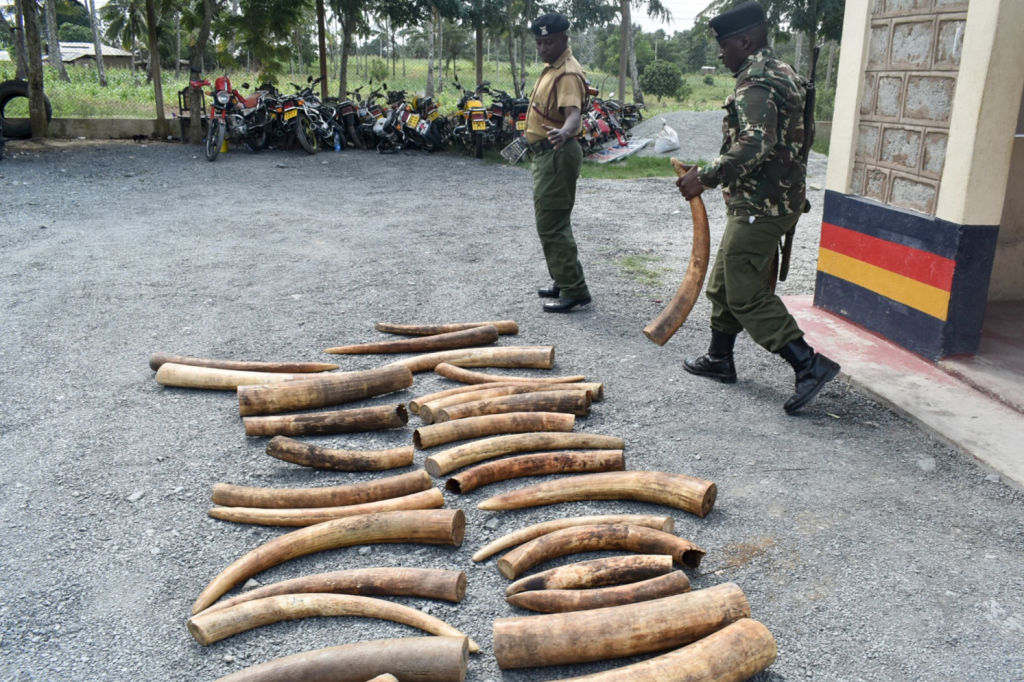ADF STAFF
Massive redwood trees tower above the floor of central Kenya’s Aberdare National Park, home to an array of animal species, including antelope, buffalo, elephants and endangered species such as black rhinos, mountain bongos, black and white colobus monkeys and the African golden cat.
The 767-square-kilometer park, featuring moorlands, mountains and rainforests, is also a hotspot for wildlife poaching and illegal logging. One recent day, a group of uniformed men and one woman, flanked by armed rangers, moved quietly through a thicket overrun by the forest’s stinging nettles. Wilson Gioko, the group’s leader, spotted a mound of fresh dung and whispered, “Stop.”
Soon, the group heard a trumpeting sound from deep in the forest, confirming Gioko’s suspicions that wild elephants were nearby.
“We must not disturb them,” Gioko said in an Al Jazeera report.
Gioko and his team are part of the Aberdare Joint Surveillance Unit (AJSU), which patrols the park looking for evidence of poaching and illegal logging. Members of the unit are mostly former poachers or former illegal loggers.
Formed in 2010 by the Kenya Wildlife Service and Rhino Ark, a Kenyan nongovernmental organization, the unit removes snares placed by poachers, manages bushfires, seizes poached animals and plants, conducts wildlife censuses, and helps arrest criminals.
Flanked always by rangers with the Kenya Wildlife Service (KWS) and the Kenya Forest Service (KFS), the unit reveals to conservationists the tactics, pathways and tools used in poaching activities.
“Reformed poachers form an integral part of the team, because they are well versed with [the] rugged terrain and remote nature of Aberdare forest,” Adam Mwangi, a Rhino Ark community manager, told the nonprofit organization FairPlanet. “They already have prior knowledge of the behavior of wildlife species in Aberdare forest and National Park, and they already know the gangs involved in illegal activities, including the time and space where they operate in.”
Among the unit’s reformed poachers is John Mugo, 50, who recalled several past run-ins with the Police, the KFS and KWS. He said he was handcuffed three times after being caught putting snares on trees in the forest. The traps included spears, some with deadly poisons that killed animals instantly.
“One day when I went back to check what was trapped, I found a black rhino lying dead,” Mugo told Kenya’s Nation newspaper in 2022. “That was how I gave up on my poaching character.”
A typical day for the unit starts around 5 a.m. An aerial support team relays coordinates of suspected poaching and illegal logging hotspots to the unit via GPS. The unit then surveils those areas on the ground with rangers. At nightfall, the unit sets up camp; it covers about 700 kilometers of forest every month.
According to FairPlanet, the community around the park has for years grappled with a human-wildlife conflict that led to crop destruction and the killing of animals in retaliation. The unit also monitors a 400-kilometer fence erected in the forest to address the issue.
Christian Lambrechts, executive director of Rhino Ark, told Al Jazeera that hiring members of the community with a background in wildlife crime was a strategic decision — not only due to their insider information, but also to help promote anti-poaching attitudes in the community.
Mugo said that his work has “transformed” the way “quite a number of people” in his village view poaching and illegal logging.
“They now see the benefits of conserving the environment,” he told Nation.
Since the AJSU’s formation, illegal activities in the forest have declined by about 80%, while the prosecution of wildlife and forest crimes have seen a 90% success rate, according to FairPlanet.
Still, the unit faces challenges, as loggers and poachers have devised new, intricate methods to advance their activities. In response, the AJSU has begun dark sting operations to catch poachers off-guard and has established intelligence-gathering cells.

